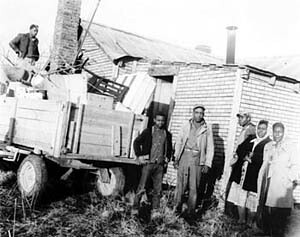
African American tenant farmers in Fayette County, Tenn. were removed from the land where they worked in 1960. They had registered to vote in the segregated south., a photo by Pan-African News Wire File Photos on Flickr.
Supreme Court decision to hear Shelby Voting Rights challenge met with praise, worry
By Kim Chandler | kchandler@al.com
November 09, 2012 at 9:52 PM
The Supreme Court said today that it will hear Shelby County's challenge to a provision of the Voting Rights Act that requires certain states with a history of racial discrimination to get federal approval before changing their election procedures.
The decision was greeted with cheers from Shelby County's attorney, who said Southern communities have changed and no longer need such burdensome 1960s-style oversight from Washington. However, it was met with concern by others who argued that things haven't changed that much and the protection for minorities remains merited.
"We're extremely pleased. Section 5 pre-clearance is a burden on local governments and 16 states," said Shelby County attorney Frank "Butch" Ellis.
Ellis said the pre-clearance requirement served a critical function for 40 years, but is no longer justified. Eighty-five percent of Shelby County's residents are white. But Ellis said black residents have been elected as mayor and to other political positions.
"The South is not the same old South that it was," Ellis said.
Section 5 of the landmark Voting Rights Act of 1965 requires all or parts of 16 states with a history of racial discrimination in voting to get federal approval before making any elections-related change such as redrawing lines or implementing voter identification requirements.
The justices said they will examine whether the formula determining which states are covered is outdated because it relies on data that is now 40 years old.
Alabama was part of a coalition of states that supported Shelby County's challenge.
"Section 5 served a critical and laudable function 40 years ago, and the court held that it was constitutional then. But Section 5 is not justified now, and its re-authorization in 2006 was not constitutional. Section 5 currently serves only to allow federal bureaucrats to block good-faith and nondiscriminatory changes in state law and to impose unjustified costs on state and local governments," said a statement issued by the office of Alabama's attorney general.
The South is not the same old South that it was," said Shelby County lawyer Frank Ellis.
However others took a different view.
Ryan Haygood, of the NAACP Legal Defense and Education Fund, which represents black residents in Shelby County, said the court's decision to hear the case provides the court an opportunity to review a "very substantial record."
"Congress considered Section 5's utility in 2006 and found discrimination in voting persists and the Act was needed for another 25 years, and Alabama is a very good example of why Section 5 is still needed," Haywood said.
Haygood said Section 5 was used in this election to stop discriminatory redistricting and voter photo identification efforts in Texas, and also in Florida to stop early voting days from being cut in half.
Birmingham's Rep. Demetrius Newton, who served as the first African-American Speaker Pro-Tem of the Alabama House of Representatives, said he was not surprised the high court agreed to hear the Shelby case, but he is concerned about what it could mean.
Newton said he believes there are still efforts to try to limit the voting power of minorities.
"I still see a lot of problems that I believe need to be addressed," Newton said.
Staff writer Brian Lawson and the Associated Press contributed to this report.
No comments:
Post a Comment